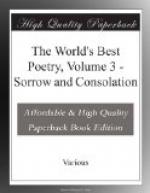“And her modest answer and graceful air
Show her wise and good as she is fair.
“Would she were mine, and I to-day,
Like her, a harvester of hay.
“No doubtful balance of rights and wrongs,
Nor weary lawyers with endless tongues,
“But low of cattle, and song of birds,
And health, and quiet, and loving words.”
But he thought of his sister, proud and cold,
And his mother, vain of her rank and gold.
So, closing his heart, the Judge rode on,
And Maud was left in the field alone.
But the lawyers smiled that afternoon,
When he hummed in court an old love tune;
And the young girl mused beside the well,
Till the rain on the unraked clover fell.
He wedded a wife of richest dower,
Who lived for fashion, as he for power.
Yet oft, in his marble hearth’s bright glow,
He watched a picture come and go;
And sweet Maud Muller’s hazel eyes
Looked out in their innocent surprise.
Oft, when the wine in his glass was red,
He longed for the wayside well instead,
And closed his eyes on his garnished rooms,
To dream of meadows and clover blooms;
And the proud man sighed with a secret pain,
“Ah, that I were free again!
“Free as when I rode that day
Where the barefoot maiden raked the hay.”
She wedded a man unlearned and poor,
And many children played round her door.
But care and sorrow, and child-birth pain,
Left their traces on heart and brain.
And oft, when the summer sun shone hot
On the new-mown hay in the meadow lot,
And she heard the little spring brook fall
Over the roadside, through the wall,
In the shade of the apple-tree again
She saw a rider draw his rein,
And, gazing down with a timid grace,
She felt his pleased eyes read her face.
Sometimes her narrow kitchen walls
Stretched away into stately halls;
The weary wheel to a spinnet turned,
The tallow candle an astral burned;
And for him who sat by the chimney lug,
Dozing and grumbling o’er pipe and mug,
A manly form at her side she saw,
And joy was duty and love was law.
Then she took up her burden of life again,
Saying only, “It might have been.”
Alas for maiden, alas for judge,
For rich repiner and household drudge!
God pity them both! and pity us all,
Who vainly the dreams of youth recall;
For of all sad words of tongue or pen,
The saddest are these: “It might have been!”
Ah, well! for us all some sweet hope lies
Deeply buried from human eyes;
And, in the hereafter, angels may
Roll the stone from its grave away!
JOHN GREENLEAF WHITTIER.




